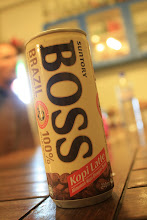
Courtesy of the US Government.
In an effort to; A. produce more material for this blog, B. catalog my thoughts, experiences, and states of mind, and C. make myself seem more important to myself by putting my self-valued thoughts and words in a public place. I have decided to start making entries to preserve my immediate thoughts on some of the books I read. (I'll probably post all of the books I read, I just say "some" because it makes myself think I read a lot). I'm going to call it, "The Book Club of Me."
ATTENTION ALL 5 READERS: I tend to read non-fiction, or historically based fictional stories, which usually don't end in surprises. In the event that I do read a fiction with a shocking ending that you didn't already know...YOU spoiled the ending, not me. I didn't waste my time reading this, you did.
--Take One---
The Jungle -Upton Sinclair
This book has a very significant historical context in America. Before publication as a novel, the story was published as a series. Although Sinclair wrote the series to expose the terrible working conditions in the meat packing industry; in it's wake, the country instead reduced it's consumption of meat in reaction to the horrific descriptions of diseased and rancid meat passing through inspection. You can read more about it here. Don't blame me for citing Wikipedia, blame Wikipedia.
A little personal background: I use to think those who are hard up were left to that result after making poor personal choices. Before someone enlightened me, I had no basis to think otherwise. From the perspective of a person benefiting from the system, it's easier to damn someone's character than to understand their situation.
The story in The Jungle follows a Lithuanian family through their struggles immigrating to Chicago after hearing stories of wealth from the land of opportunity. When the family arrived they instantly found difficulties finding housing due to their lack of finances after the trip. Over a short while, they found work in the meat packing industry and financed a house. As it turned out over time, the lending and housing agency had failed to mention interest and other monthly additions. The family was able to make ends meet by finding employment for everyone, spare the grandmother and the toddlers. Eventually, a series of unfortunate events resulting from harsh working conditions and ruthless employers left the strong young man, Jurgis, bed-ridden first; in jail second. Meanwhile, the family was not able to satisfy their lenders and were left out in the cold. As it turned out, this was just the beginning of the landslide for the characters in this book. By the time rock bottom was reached, most of them weren't alive to experience it. They had succumb to the harsh realities of the system. The book ends on a positive note for Jurgis. He finds Socialism is his answer to the system.
It's no surprise to me that a country founded by taking advantage of people had, has, and will continue to take advantage of people. I found many of the social issues presented in The Jungle have extremely close if not exact similarities to present issues facing America. Consider this quote from the book, "...because the majority of human beings are not yet human beings at all, but simply machines for the creating of wealth for others." I find it easy to draw a parallel to the present for two reasons. First, the American dream--then and now--is to become wealthy and enjoy the rights provided in the Constitution. Though the latter is reasonably protected, what percentage of Americans can say they enjoy the former? The reality is that most Americans become the machines, providing the labor to put money in someone else's pocket. Second, the right to vote--again, then and now--is hindered by a select few who are controlling, misleading, and manipulating voters. Thus, we citizens, as a voting public have to actively fight against those that want to make us cogs in the polarized machine we can't control.
In the last chapter of the book, under the pretext of a intimate meeting of thinkers, Sinclair almost completely drops the story line and goes on a rant in support of Socialism. He discusses the waste generation of the individualism and competition inherent in Capitalism and then the efficiency and equality of Socialism for the greater good. Throughout this dialog are many compelling arguments against the flaws of Capitalism, a very pleasing and objective take on consumerism, a few positive outlooks of Socialism, and some strange examples of Communism. Just think of how much time and money the aggregate of every household in America can save by implementing community dish washing machines (note: dish washing machines weren't around 1906, so it's likely Sinclair didn't think they would be a popular household appliance one day.).
The positive side to the whole story is the slow change for the better. The situation for laborers in the early 20th century was grim. Even after this series was printed, the public reacted more to the poor meat inspection standards, not the labor issues. At the time there were no labor unions, there was no government support through welfare or housing, nothing. As the story in this book repeatedly surfaced in different cities laborers began to fight and eventually won their rights. Government policy and programs have been developed to better help those in need and protect the innocent from predators (or not). Even though from time to time, the power of the system corrupts itself, America has made many improvements for the common good over the last century.




No comments:
Post a Comment